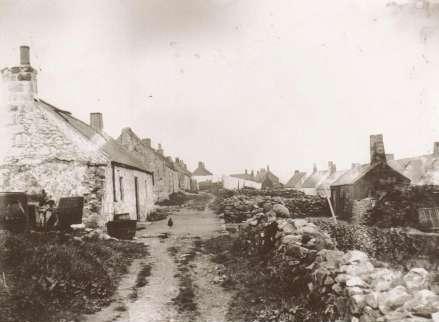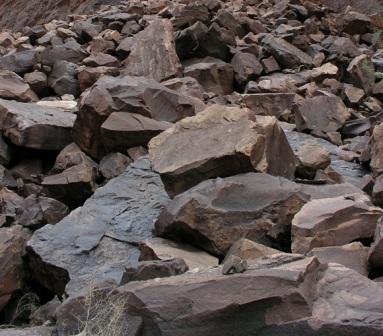
Eight Downies Boats Lost – on Land! (1869) |
Around midnight on Tuesday 16th November the majority of the boats based at Downies were wiped out, in total eight boats were lost overnight and would never sail again. This was quite a sizeable disaster and what is unusual about it was that none of the crews were injured or lost; in fact most of them would have been fast asleep in their beds unaware that anything was amiss.
So, what were the circumstances behind this extraordinary event?
A landslide had occurred in Downies Haven which resulted in five boats being buried in up to ten foot of rocky debris, and a further three boats being partially covered, but with enough damage to prevent them being put to sea again.
This incident was discovered the following morning when the fishermen went down to the shore and were confronted with the view of the haven in disarray as a result of an overhanging cliff collapsing during the night. Most of the berthed boats were buried under mounds of earth and masses of fallen rocks.
 Several of the local residents declared that they had
heard an unusual, low, rumbling sound shortly after midnight however
their assumption was that it was likely to have been thunder so no one
ventured outside to make an investigation. Unfortunately the sound they
had heard was a large part of the cliff falling away into the small
harbour which was located approximately two hundred yards away from the
front row of village houses.
Several of the local residents declared that they had
heard an unusual, low, rumbling sound shortly after midnight however
their assumption was that it was likely to have been thunder so no one
ventured outside to make an investigation. Unfortunately the sound they
had heard was a large part of the cliff falling away into the small
harbour which was located approximately two hundred yards away from the
front row of village houses.
In some ways the fishermen were quite fortunate because a few of them were still engaged in hauling up their boats as late as eleven o’ clock the previous evening, little more than an hour before the landslide had occurred. Had they been working any later or had the landslide occurred an hour earlier then they could have lost their lives – there is little in the way of an escape route in this small haven and they would have been engulfed in seconds.
The Aberdeen Journal reported the likely cause of the landslide as follows, “The recent heavy rains have doubtless had the effect of loosening the earth holding the rocks together, and which overhung a natural cavern, flooded at high tide, with no support whatever from below”.
I’m very familiar with this section of rocks, as this is one of the places where I set my creels during the summer months, and my own conjecture is that part of the rocks known as the “Knaps of Downies” had slipped away and covered much of the north side of Downies Haven as there are plenty of large, loose boulders in that vicinity to suggest that’s where the landslide occurred. What is more difficult to imagine, given what we are left to look at today, is the concept of an overhanging cavern which was flooded at high tide – maybe there used to be a rock formation in this small haven that was similar to the “Bullers of Buchan”, near Peterhead.
Anyway, back to the story. The eight boats which were lost in these extraordinary circumstances were as follows; “Blossom” owned by George Wood, “Bon-Accord” owned by George Wood, “Cellert” owned by William Main, “North of Scotland” owned by George Knowles, “Brothers” owned by James Wood, “Six Brothers” owned by Andrew Main, “Isabella” owned by Moses Wood and “Brothers” owned by Robert Main. Two other boats managed to escape any damage at all and they were “Friends” owned by George Leiper and “Jean” owned by Robert Main. A number of herring boats also escaped any damage, having been already hauled up the grassy banks at the south side of the Haven at the end of the herring fishing season.
The livelihood of all of the Downies fishermen was affected by this, not only those that had lost boats which needed to be replaced, but also those fishers whose boats had escaped were unable to put to sea for a long period of time because of the blockage of rocks and debris which prevented exit or entrance to and from the shore. Subscriptions to aid the fishermen were solicited and a fund was set up although it may have been a matter of weeks, and possibly months, before there was enough money in the kitty for the fishers to “start over”.